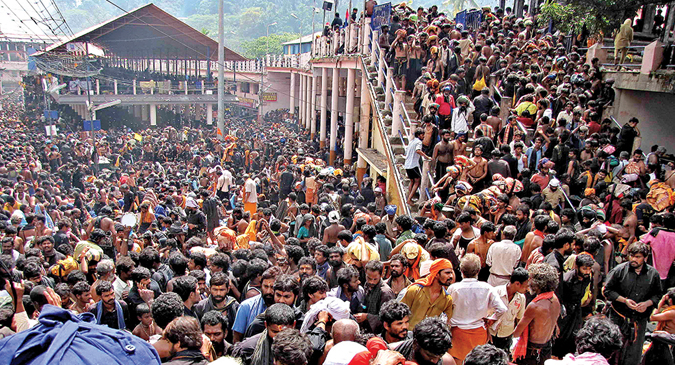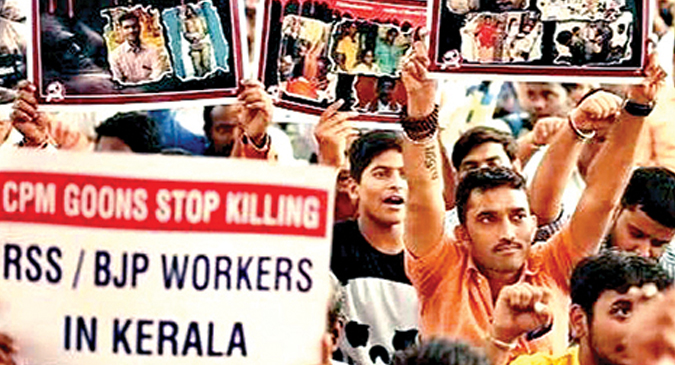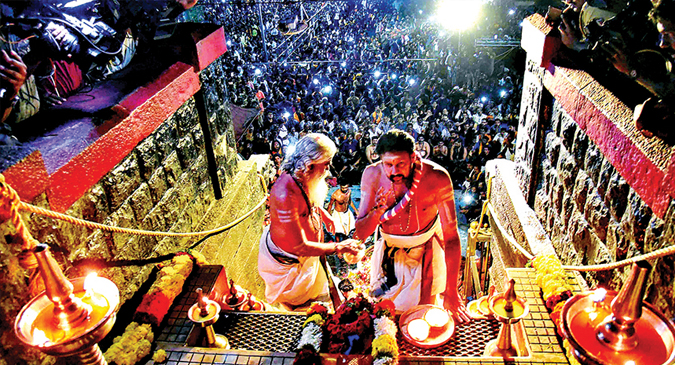Amidst the competition for electoral predictions, there seems to be unanimity that Communist parties of India are losing ground in their bastion. Will Sabarimala turn out to be a waterloo moment for the Leftfront in Kerala?
SP Puthiyedam
Election season is upon us and it is the grandest festival in our democracy. It is the turn of the entire nation to choose the dispensation they want to steer the country’s fortunes for the coming five years. All indicators point to the continuation of the Narendra Modi dispensation for five more years. However, it is wise for people to hold their horses until counting day.

Ayyappa devotees at Sabarimala Temple
In this backdrop, we focus on Kerala and what will be the issues that will find a place in the voters’ minds as they go to cast their ballot. Kerala is unlike any other state in India having a tendency to vote mainly on regional issues rather than national ones even during national elections. However, this time is a different scenario as there are many national issues that have taken up centre stage lately. There are several local issues as well. Kerala has a habit of alternatively voting either the Left Front, the LDF, led by the CPI (M) to power or the United Democratic Front, the UDF, led by the Congress. The BJP has begun to make inroads into Kerala, and the 2016 Assembly Elections saw them opening their account in the state with one MLA seat and a vote share of 15% up from 6.03% in the 2011 Assembly polls. The 2016 elections saw the ruling UDF voted out and the LDF ushered in with a grand majority.

People protesting against the killings of RSS-BJP karyakartas in Kerala
However, starting in 2014, when the Narendra Modi-led NDA came to power, national issues have been finding local echoes in the State. There was the furore started by national media over the lynching of a Muslim in Dadri because he allegedly consumed beef. Reams and reams were written about the intolerance that was rising in India under Narendra Modi, and news channels and prominent print media gave breathless coverage to this. This issue, therefore, started acquiring a pan India colour, and Kerala was not left behind. Kerala is a state which has not banned beef, and it is also a state where the electorate is hugely political. There were various beef fests organised by Left cadres in college campuses and the Congress party even openly slaughtered a calf. Whether this will turn into an election issue in the upcoming elections remains to be seen.

But the rallying point and the central issue of these elections would be the issue of Sabarimala. The ruling LDF has turned out to be the most anti-Hindu front to be in power in recent times. The most significant instance of their anti-Hindu stance is, without doubt, the handling of the Sabarimala issue. The uncalled for enthusiasm with which the Pinarayi Vijayan-led LDF has strived to take women who are between the ages of 10 and 50, (an age group ritually barred from entering Sabarimala) to Sabarimala ostensibly to uphold the Supreme Court verdict (which overruled the ritual ban), has exposed his party’s active hatred for Hindus. The events that unfolded in Sabarimala since October 2018 have caused deep and lasting wounds in the Hindu psyche in Kerala. Disregarding the unwavering but peaceful resistance from the Hindu community to the entry of women of a certain age to Sabarimala, the state government aggressively and relentlessly pushed to breach the customs and traditions.
Sabarimala has been the one rallying point for the consolidation of Hindus as a vote bank, and this would certainly have far-reaching repercussions for the direction of Kerala politics.What hurt Hindus the most was the government trying to push activists from Muslim and Christian communities to not just break the traditions but also defile the place by allegedly bringing sanitary napkins and so on in their irumudi kettu. The government’s stance that they were bringing progress and “renaissance” to a regressive practice found practically no takers. Collectively, Hindus felt that they had been violated in their deepest core. The resistance to the government was successful almost entirely but again when Hindus were beginning to feel that they had secured the temple, they were betrayed. When the state’s attention was drawn towards the “Vanitha mathil” or “Women’s wall” in “celebration of Navotthanam” or “renaissance”, organised by the government, two women activists, under the cover of night and with the help of the state police, managed to breach the resistance from the devotees and reach Sabarimala, to the sanctum sanctorum. It is evident from their furtive attempt that all they were interested in was to break the tradition and show evidence, far more than actually praying at the shrine. Their focus was to take photographs of their so-called daredevil attempt in the face of stiff resistance. Hindus perhaps would not have felt the extreme revulsion they did at this breach if the women were pure devotees, but the fact that it was just an unbridled show of power of the state, really twisted a knife in the Hindu’s heart.
Hindus finally came to realise that they would need to need to fight it out if they were to survive against hostile state power. Sabarimala has been the one rallying point for the consolidation of Hindus as a vote bank, and this would certainly have far-reaching repercussions for the direction of Kerala politics. The Sabarimala episode has perhaps also opened the eyes of some of the Christian denominations are also beginning to see the danger in allowing communist ideology which is equivalent to another religion, to hold sway and impose its totalitarian ideology on other natural religions. They realise that if such a dispensation could interfere in the religious beliefs of Hindus today, tomorrow, they could also impose their will on Christian beliefs and traditions. Thus, some Christian groups are also coming together with the national NDA alliance post the Sabarimala episode. Sabarimala could be the one single rallying point of this election, and the beneficiaries of this consolidation of Hindu votes could be the BJP.
The political killings in Kerala with the unrelenting attacks on BJP and RSS cadres by the communists, while being a long-standing issue, has now gotten enmeshed with the Hindu issues post-Sabarimala. Recently, two youth in Kasargod were killed by communist goons, ostensibly because they identified with the Sabarimala issue and lent support to the resistance. This is only one more instance of murder in a long-standing war with the Sangh Parivar by the communist cadre. But these killings have helped further consolidate the Hindu vote base because they identify with the slain youth as Hindus who are persecuted. Thus, this saga of political murder will also have its echoes in the coming election.
These elections will be a report card for the ruling LDF. There is a general feeling that women in Kerala are strangely not safe, despite the State having near 100% literacy and high representation of women in the workforce. But it is a general opinion that women are more unsafe during LDF rule than during the opposite party rule. Giving substance to this argument is the recent accusation of rape alleged by a woman against the ruling CPM cadre. This is rocking the CPM’s reputation further in the State. A woman has alleged that a CPM party worker sexually abused her in the party’s offices in Palakkad. This case has lent further credence to the charge that atrocities against women are on the rise under LDF rule. This is sure to have an impact on voting on April 23rd.
The instances of Love Jihad and the growing influence and collusion of SDPI, the political wing of PFI (Popular Front of India) which has links to fundamentalist and radical Islamists with the ruling LDF, is creating an atmosphere of fear and insecurity in the state. This is also likely to be a talking point in the elections.
The many schemes of the Modi Government, mainly the Kisan Samman scheme has made an impression on the voters. They see how the many schemes that have been put forward by the Modi government Like Kisan Samman and Ayushman Bharat are geared to lift people out of poverty and empower them in the true sense of the word. This is likely to have some impact on the voting though for the large part Keralites vote for ideas and ideologies and not so much for practical schemes.
(The writer is Kerala based political commentator)














Comments